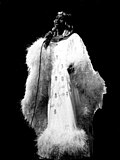Inductees
| † | Indicates posthumous induction |
|---|---|
| Year | Image | Inductee | Nationality | Rationale | Ref. |
|---|---|---|---|---|---|
| 1994 |  | Celia Cruz | Cuba | For their contributions to Afro-Cuban music in the 20th-century. | [2] |
 | Cachao | Cuba | |||
| 1995 | Selena † | United States | For her "numerous achievements" as a Tejano artist within three years before her death. | [7] | |
| 1996 |  | Juan Gabriel | Mexico | For composing "irresistibly catchy songs of common, everyday affairs which anyone can identify" for other artists and to himself. | [13] |
| 1997 |  | José José | Mexico | For his 30 years of "caressing a multitude of unforgettable love songs with an earnest, yet seemingly vulnerable delivery". | [14] |
| 1998 |  | Vicente Fernández | Mexico | For his ability to "connect emotionally with his listeners and fans, whether on CD or onstage" with his ranchera music. | [15] |
| 1999 |  | Rocío Dúrcal | Spain | For her versatile performances of pop, Spanish, and Mexican music. | [16] [17] |
| 2000 |  | Marco Antonio Solís | Mexico | For his "quivering tenor, not to mention his writing and producing skills, has had a profound effect on Latin music" as well as influential in creating the grupera genre. | [18] |
| 2001 |  | Mongo Santamaría | Cuba | For bridging "Afro-Cuban grooves, jazz and R&B" with his conga performances. | [19] |
| 2002 | No induction | [20] | |||
| 2003 |  | Armando Manzanero | Mexico | For his contribution to the Latin music genre by composing "romantic" songs. | [21] |
| 2004 |  | Banda el Recodo | Mexico | "For their extraordinary 65 year-long career and successful bid to take Mexico's Banda music to virtually every corner of the world". | [22] |
| 2005 | No induction | [10] | |||
| 2006 |  | Joan Sebastian | Mexico | For his "stellar career that spans 30 years and more than 30 albums". | [23] |
| 2007 | No induction | [24] | |||
| 2008 | [25] | ||||
| 2009 | — | Raúl Alarcón, Sr. † | Cuba | "For his extraordinary contributions to the Latin radio and music business in the United States". | [8] |
| 2010 | No induction | [26] | |||
| 2011 | [27] | ||||
| 2012 |  | Marc Anthony | United States | "For his global influence as a performer in both the English and Spanish language markets". | [28] |
| 2013 | No induction | [29] | |||
| 2014 |  | Franco De Vita | Venezuela | For his "perceptive pop/rock ballads" that "have brought him international fame over his three-decade career". | [30] |
| 2015 | No induction | [31] | |||
| 2016 |  | Alejandro Fernández | Mexico | For launching his career "as a champion of ranchera music before crossing over to the Latin pop mainstream". | [32] |
| 2017 | No induction | [33] | |||
| 2018 | [34] | ||||
| 2019 | [35] | ||||
| 2020 |  | Carlos Vives | Colombia | For "his career as a singer-songwriter" and "his multifaceted career as a host, actor and philanthropist". | [36] |
| 2021 |  | Daddy Yankee | Puerto Rico | For his "fruitful career that spans over three decades as a pioneer and top exponent of reggaeton". | [37] |
| 2022 |  | Nicky Jam | United States | For his "prolific work that transcends musical genres and languages". | [38] |
| 2023 | No induction | [39] | |||
| 2024 |  | Pepe Aguilar | Mexico | For captivating "audiences worldwide with his unique blend of traditional Mexican sounds and contemporary elements". | [40] |
| 2025 |  | Elvis Crespo | United States | For "his 30-year career". | [41] |